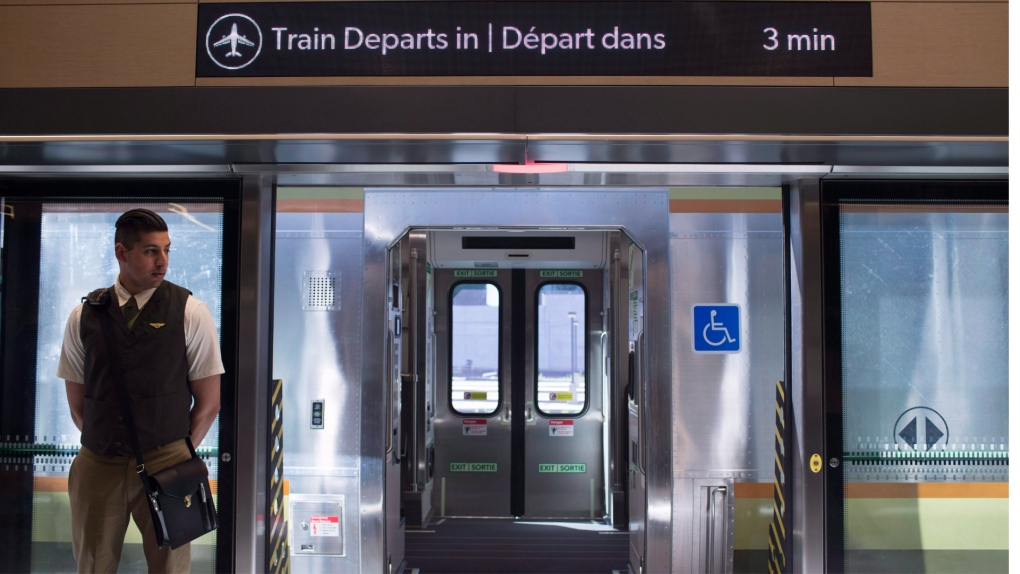Ontario backtracks on planned UP Express changes after backlash

The Ontario government is backtracking on planned changes to the UP Express service after the announcement drew backlash from Toronto residents.
In a social media post Tuesday evening, Transportation Minister Prabmeet Sarkaria said he had directed Metrolinx not to proceed with the changes, which would have limited stops on the express line to two transit stations.
While the intention was to provide a faster option for people travelling between Union and Pearson, I’ve heard riders’ concerns about servicing Weston and Bloor stations along the UP Express line.
I’ve directed Metrolinx to not proceed with these changes.
— Prabmeet Sarkaria (@PrabSarkaria) April 16, 2024
“While the intention was to provide a faster option for people travelling between Union and Pearson, I’ve heard riders’ concerns about servicing Weston and Bloor stations along the UP Express line,” Sarkaria said in a post.
The reversal comes after nearly 3,000 people had signed a petition to reverse the changes. The petition was created Monday after the Ontario government announced changes to GO Transit and UP Express (UPX) service.
As part of the announcement, the government said that every second train on the express route will be non-stop between Union Station and Toronto Pearson International Airport.
The UP Express runs every 15 minutes, which means that under the new service changes, residents at Weston and Bloor stations will only be able to access the line every 30 minutes.
The government has said the change will be offset by an increase of trains on the Kitchener GO line, which also stops at those two stations. Service will increase to 30-minute frequency along the line in midday and evenings between Bramalea GO and Union Stations, and some weekend trips will be increased to 10 cars.
Earlier, Sarkaria told reporters that the UP Express was always meant to be a connection between Union Station and Pearson airport.
“We’re seeing an increase in demand for people wanting to get to the airport,” he said at Queen’s Park.
“But I want to assure everybody that Kitchener line expansion will ensure commuters have those options to travel to Union through those stops every 30 minutes.”
A petition posted to change.org on April 15 argues the new service impacts accessibility to downtown Toronto and will exacerbate “existing issues of overcrowding” while reducing convenience, something the organizer said “drew many of us to our neighbourhoods in the first place.”
“The changes to the UP Express schedule jeopardize the very essence of efficient and accessible public transportation for residents of underserved communities like Weston,” the petition says.
“For many of us, the UP Express is not just a mode of travel but a lifeline—a means to reach downtown Toronto swiftly and reliably.”
Concerns include overcrowding during rush hours along the Bloor subway line. It takes about 15 minutes to travel between Weston Station in the city’s west end and Union Station in downtown Toronto on the UP Express—the petition notes it takes about 1.5 hours on the TTC.
City Councillor for Davenport, Alejandra Bravo, said on social media that one in four airport workers rely on public transportation to get to their place of employment.
“After UPX fare increases for airport workers earlier this year, this change to the UPX schedule for airport workers in Davenport Toronto will make it even harder to get to work,” she said.
“These changes will also impact people in our community getting to and from downtown and Weston. Even with improved GO Service, poor schedule coordination and delays may leave people waiting.”
Before the reversal of the changes, a spokesperson for Metrolinx said that commuters at Weston and Bloor would still experience roughly 15-minute service between the UP Express and GO, with about four trains running per hour.
Expanding the number of trains along the Kitchener Line would also allow more people to utilize the province’s One Fare program, which allows for free transfers between the TTC and GO Transit lines, making it a more affordable option for some people.
Metrolinx said that overcrowding on UP Express platforms was also a factor.
Sarkaria’s office said the decision not to proceed with the changes on the UP Express will not have any impact on the extra service being added on the Kitchener line, which is set to go into effect on April 28.
View original article here Source









